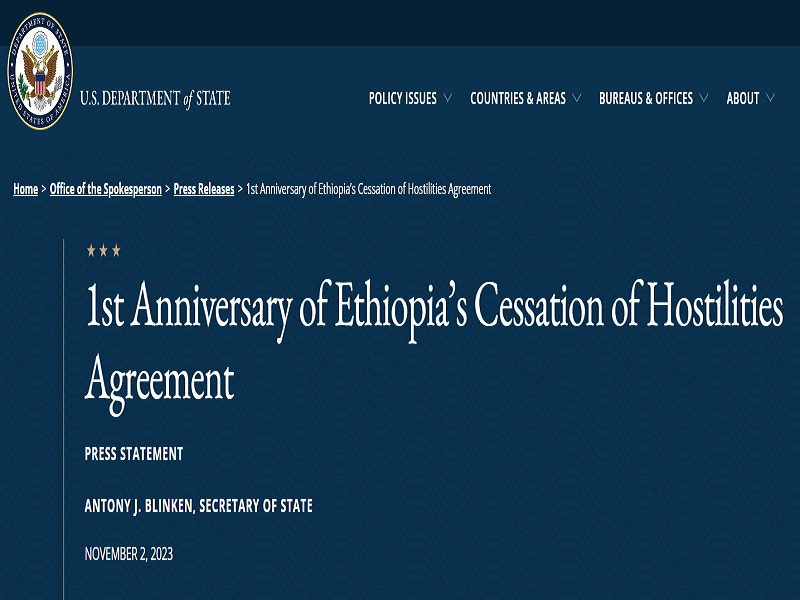The US Is Once Again Trying To Stir Trouble Inside Ethiopia & Between It And Eritrea
Instead of respecting Ethiopia’s sovereign right to manage its domestic and international affairs, the US is pressuring it through unsolicited demands into complying with its preferred policies that aim to maximally divide-and-rule the Horn of Africa.
Secretary of State Blinken’s press statement on the “1st Anniversary of Ethiopia’s Cessation of Hostilities Agreement” is full of unfriendly remarks which prove that the US is once again trying to stir trouble inside Ethiopia as well as between it and Eritrea. Instead of respecting that country’s sovereign right to manage its domestic and international affairs, the US is pressuring Ethiopia through unsolicited demands into complying with its preferred policies that aim to maximally divide-and-rule the Horn of Africa.
This approach becomes apparent in the third paragraph when Blinken said that “Eritrea must fully withdraw” from Ethiopia’s Tigray Region. It’s not the US’ place to make such a demand, especially when Ethiopia itself hasn’t confirmed that those troops are still there, let alone refusing to leave. Those two’s reported military cooperation in this region has been a subject of speculation, but nevertheless, Ethiopia has the right to request its neighbor’s support if it so chooses as well as retain the aforesaid if it wants.
The next part of the statement suggests that the US is seeking to politicize such speculation by demanding that “Both Ethiopia and Eritrea must refrain from provocation and respect the independence, sovereignty, and territorial integrity of all countries in the region.” This implies that Eritrea is either disrespecting Ethiopia in such a way by seemingly refusing to withdraw and/or that Ethiopia is provoking Eritrea in some vague way, both narratives of which serve to divide-and-rule.
Moving along, it’s very disturbing that Blinken felt the need to say that “We also remain concerned about ongoing conflicts – in Amhara, Oromia, and elsewhere – that threaten Ethiopia’s fragile peace. Continued human rights violations and abuses by multiple actors and the circulation of toxic rhetoric further erode a social fabric worn thin by war.” It’s also not his place to comment on the unrest in those regions, let alone to hint that the authorities might be committing human rights violations there.
The pressure that the US is putting on Eritrea isn’t anything new, but what might have surprised some is that it’s continuing to pressure Ethiopia even after its Northern Conflict ended one year ago. Back then, Washington politically supported the TPLF rebels that were previously designated by Addis as terrorists, but now it’s expanded its umbrella of potential partners to include all those that are nowadays opposed to the government in any way. The US’ goal appears to be weakening Ethiopia by all means possible.
To be clear, the US’ tacit sympathy with one or another cause doesn’t automatically discredit it, nor should this observation be spun to impugn those of its adherents who remain peaceful, aren’t extremists, and follow the law. This piece here touches upon the complexities of Ethiopia’s domestic challenges, which require extensive dialogue by all well-intentioned actors in good faith to resolve. By inserting itself into this process in the rude way that it just did, the US is impeding peaceful solutions.
In the event that its divide-and-rule domestic meddling fails, then the US’ backup plan is to divide-and-rule the region by exacerbating speculative mutual suspicions between Ethiopia and Eritrea at the state and civil society levels, the objective of which it’s pursuing at the same time as was seen. The unintentional uproar caused by Prime Minister Abiy’s remarks about the need to preemptively reduce Ethiopia’s dependence on Djibouti in order to avert a possible future war set the stage for these efforts.
Mutual trust at the civil society level was damaged by the ensuing speculation of his geopolitical intentions, which the US is now attempting to exploit as evidenced in that part of Blinken’s statement. The Eritrean state’s calm reaction reduced the chances of the US’ latest plot succeeding, but public opinion on both sides now needs to be effectively managed, especially among some forces on the Ethiopian one. As difficult as it may be, it’s expected that this will succeed and the US’ plans will thus fail.


